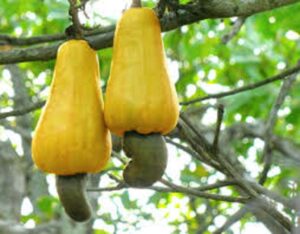Cashew production and export received a boost at the weekend, as the Federal Government and the United States Department of Agriculture, USDA, West Africa PRO-Cashew Project, signed Memorandum of Understanding, MoU, to develop the nation’s cashew industry.
This was contained in a statement signed by the Director, Information, Federal Ministry of Agriculture and Rural Development, Theodore Ogaziechi, where the Minister of Agriculture and Rural Development, Mohammed Nanono signed on behalf of Nigeria with the team from USDA, West Africa PRO-Cashew Project.
According to Nanono the initiative will improve productivity, expand the national hectarage of the commodity towards achieving national food and nutrition security, revenue generation, exchange earnings, wealth creation, and employment in the country.
He further stated that the government’s focus is to continuously and sustainably develop the commodity for export, and emphasized the need for the USDA West Africa PRO-Cashew Project and other stakeholders to achieve objectives of the MoU as it would help the country formulate the right programmes, guide future interventions and woo investors to grow the value chain.
He also made it known that since the 1990s, cashew has increased Nigeria’s Gross Domestic Product, GDP, as it ranked 2nd non-oil export foreign exchange earner for the country, which generated about $500 million in 2018, providing a livelihood for about 300,000 to 500,000 families mostly youths and women in Nigeria.
Others who witnessed the signing include the Executive Director Cocoa Research Institute of Nigeria, CRIN, Dr Adeola Patrick; Huxley, Bishnu Pattanaik; and President of National Cashew Association of Nigeria, NCAN, Hon Ojo Ajanaku.
He said: “Currently the national production capacity of cashew in 2020 was 260,000 metric tonnes on 100,000ha of land. The average yield was 600kg/ha as against the global average of 1.230kg/ha.
“This initiative would help the Ministry achieve the targeted increased production capacity from 260,000mt in 2020 to 350,000mt by 2023, and the processing capacity from 15 per cent in 2020 to 35 per cent by 2023.”
Meanwhile, the Minister has constituted the Cashew Value Chain Working Committee to look into the problems and challenges affecting the growth of the cashew value chain in the country as a way to implement areas of the collaboration with USDA West Africa PRO-Cashew project.
He also explained the essence of the committee, which is basically to support USDA West Africa PRO-Cashew Project to develop a 10-Year Strategic Plan for Nigeria Cashew project, which members of the committee include chairman, Managing Director, the Nigeria Agribusiness Registrar, Roland Oroh, Director, Federal Department of Agriculture (FDA) Karima Babangida, as member, and other stakeholders.
It was also made known by Karima Babangida that Nigeria has been selected alongside Benin, Burkina Faso, Cote d’ lvoire for the project, while appreciating USDA West Africa PRO-Cashew Project’s intervention strategies to improve the cashew industry in Nigeria and the West Africa Sub-region.
The Chief of Party/Managing Director of the USDA West Africa PRO-Cashew Project, Jeans Francois Guay, while making presentation explained that the project is a five years West Africa Cashew project (PRO-Cashew), implemented by Cultivating New Frontiers in Agriculture (CNFA), an international development organization headquartered in Washington, DC.
Guay also said through the USDA West Africa PRO-Cashew Project, CNFA will build capacity by working with farmer organizations and agro-goods suppliers in the areas of service delivery and business, and orchard management; Develop agro-dealers and input suppliers to improve the efficiency and suitability of seedlings production system through a public-private partnership.
Meanwhile, according to him (Guay) the project is capable to catalyze up to $10 million investment opportunities, create jobs, strengthen public and private partnerships, and improve trade and cashew farmers’ productivity.

Leave a Reply